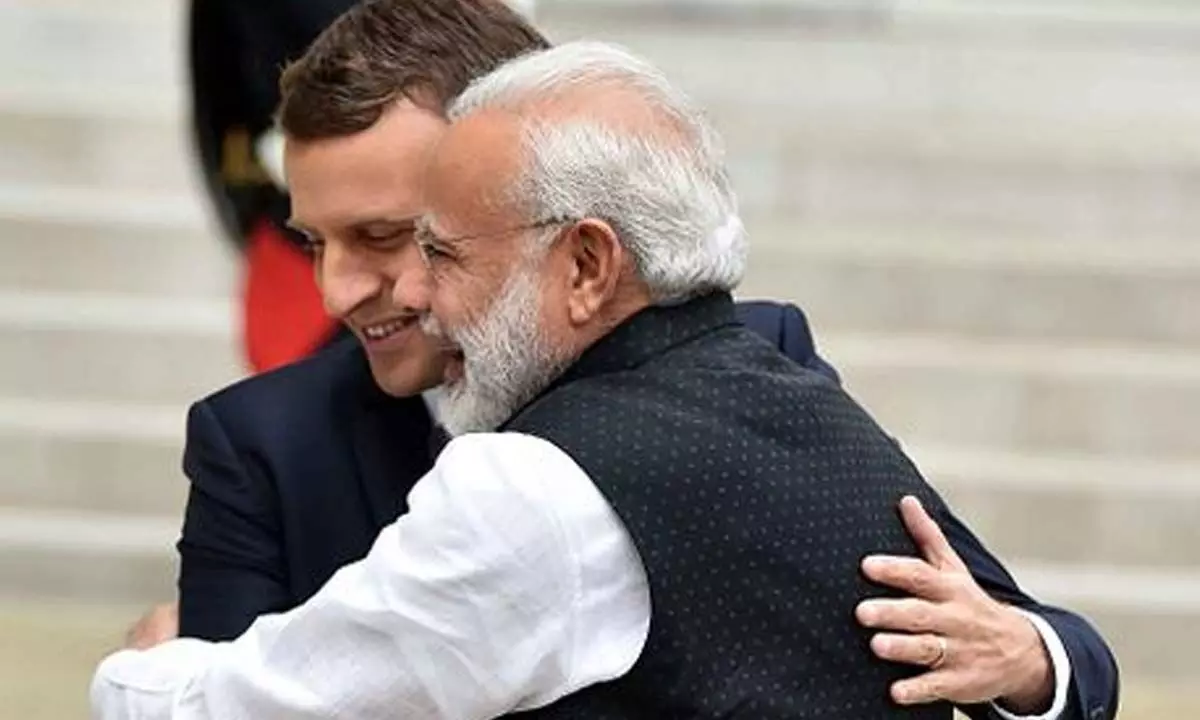Solidified India-French partnership is good augury for Indo-Pacific region
‘Assertive’ China’s strategic competition with the United States has damning ramifications
image for illustrative purpose

As the first batch of Rafale fighter jets perched down on the tarmac at Ambala Air Force base, it evoked a sense of national euphoria not seen in recent memory as far as any Indian military acquisition goes.
The Rafale brings to the table in terms of augmenting India’s air power, which it does, but essentially because the induction happened in the backdrop of an increasingly volatile geo-strategic environment.
The clashes at Galwan valley in June 2020, where 20 Indian soldiers were martyred, marked a turning point in the relationship between India and China. Such a scenario that entails reworking of strategic thinking as well as action-to deal with new challenges, has brought the indispensability of time-tested old partners back to the fore. And one such partner for India is the Mediterranean country of France.
The world is going through a time of renewed disorder – the impact of climate change is more dramatic every day, recovery is slow from the effects of Covid-19, while unfair practices undermining the global economy have multiplied and Russia’s war against Ukraine has global ramifications on food, energy security and inflation.
On the Indo-Pacific front, tensions are on the rise and an increased polarisation is seriously threatening stability or whatever flicker remains of it. China’s growing assertiveness and its increasing strategic competition with the United States have led to major transformations and disruptions, which pose serious challenges to the entire region.
In France and in Europe, a great part of our strategic, economic, demographic and environmental future is being defined. It is essential that the Indo-Pacific should not become a confrontation ground for global powers, and India and France are aligned in this vision.
At stake is the very possibility to uphold what President Macron called ‘the liberty of sovereignty’. The Indo-French partnership is built on that endeavour, to maintain through cooperation the highest level of strategic autonomy. What is also at stake is the collective ability to tackle global challenges that are critically at play in the region, which has evolved into the economic and demographic heart of the world.
France has every reason to strengthen our partnerships with the countries of the region. And this is the path that France has followed with India, its oldest strategic partner in Asia. As India is central to the dynamics, it has a strategic role to play in the Indo-Pacific region.
India is at the forefront of the strategic evolutions of the Indo-Pacific. France is indeed a resident nation of both the Indian Ocean, and the Pacific. There are major interests in the Indo-Pacific. Economic interests, with overseas territories in the two oceans-La Réunion, Mayotte, les îles Eparses in the Indian Ocean, New Caledonia, French Polynesia and Wallis et Futuna in the Pacific and territories in Antarctica. They account for 93% of France’s exclusive economic zone (EEZ), the second largest in the world. Around two million French citizens are living in the Indo-Pacific. There are also security interests, as we maintain a permanent military presence, with more than 7,000 personnel stationed in our overseas territories, Djibouti and the UAE.
French territories provide cooperation platforms. Their forces carry out sovereignty missions and take an active part, along with our many partners, in maritime surveillance and disaster relief operations for the benefit of neighbouring countries. Humanitarian assistance stocks are based there. Scientific research mission is done from there. And talking about actions for the whole region, the French Development Agency (FDA) has committed more than € 20 billion to the region. And India is one of the top recipients of preferential loans.
To summarise that the endeavour of France and EU’s strategies is a emerge as a model of cooperation to the region, promoting multilateralism, upholding the rule of law and international norms, supporting an open and fair environment for trade, supporting connectivity and green transition besides strengthening our response to global challenges.
French President Emmanuel Macron’s visit to India in 2018 concurrently saw the announcement of the “Joint Strategic Vision of India-France Cooperation in the Indian Ocean Region”.
Such a long-standing alignment of outlook has had a positive bearing, leading to the successful execution of significant defence deals, like the inter-governmental agreement between the two nations for the purchase of 36 Rafale fighter jets in 2016. This strategic relationship has produced a positive spillover effect onto other areas as well. With the steady increase of strategic consequence of the Indian Ocean and its extended maritime zones, nations across the globe are devising fresh policies to recalibrate and strengthen their scope in the region. India and France are precisely working on that.

